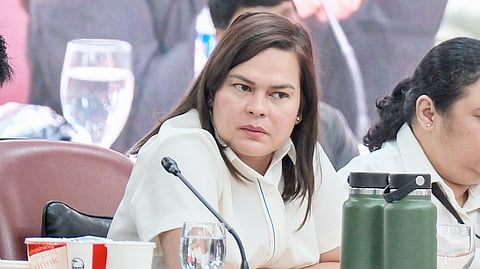
- NEWS
- the EDIT
- COMMENTARY
- BUSINESS
- LIFE
- SHOW
- ACTION
- GLOBAL GOALS
- SNAPS
- DYARYO TIRADA
- MORE

Without a temporary restraining order, the Senate could still proceed with the stalled trial of Vice President Sara Duterte, despite the Supreme Court’s ruling stating it was unconstitutional for violating the one-year bar, a Charter framer asserted Wednesday.
Lawyer Rene Sarmiento, a member of the Constitutional Commission that crafted the 1987 Constitution, pointed out that it is still the prerogative of the Senate to decide whether or not to abide by the high court’s decision, especially in the absence of a TRO.
"Since there is no TRO, the Senate can proceed because [it has] the exclusive power to try and decide all the impeachment cases. They are not prohibited from proceeding; it is the discretion of our honorable Senate whether they will actually follow the Supreme Court or not," Sarmiento said partly in Filipino in an interview.
Former SC associate justice Adolfo Azcuna, also a framer of the Constitution, agreed that the Senate does not necessarily require adherence to the SC verdict. He, however, said that it would be best for the Senate to “maintain the status quo” and hold off on proceeding with the trial, as insisting so may lead to a constitutional crisis.
The Senate, along with the House, is also a respondent to the twin petitions filed before the SC by the camp of the VP and Mindanaoan lawyers, which both seek to block the impeachment trial, alleging constitutional infirmities, including the one-year bar.
Azcuna averred that this allows the Senate to contest the decision through a motion for reconsideration or a motion for oral arguments if it wants to pursue the trial, without defying the SC order.
“They cannot go ahead [with the trial] because the decision of the Supreme Court is immediately and executory. If they go ahead, they will be violating it,” he said.
The Senate had already constituted itself as an impeachment court and acquired jurisdiction over Duterte’s case on 10 June, one day before the 19th Congress adjourned sine die. However, the SC, in a unanimous decision handed down last week, ruled otherwise.
It declared the articles of impeachment (fourth complaint) unconstitutional, null and void ab initio (from the beginning) for violating the one-year bar under Article XI, Section 3, Paragraph 5, and thereby the Senate did not acquire jurisdiction to act as an impeachment court.
The provision prohibits the filing of more than one impeachment case against the same official within a one-year period.
Sarmiento and Azcuna both have “reservations” about the SC ruling, notably its interpretation of the one-year bar and Duterte’s right to due process.
Sarmiento argued that SC effectively amended and provided a new interpretation of Francisco vs. House of Representatives—a decision made by the high court itself—that an impeachment proceeding is only deemed initiated after the verified complaint has been referred to the justice panel.
To recall, Duterte was slapped with three impeachment complaints in a span of barely two weeks in December last year, but she was only officially impeached on 5 February after the fourth complaint was signed and endorsed by 215 lawmakers.
The figure surpassed the one-third threshold to bypass the hearings by the justice committee, a shortcut route allowed by the Constitution. This resulted in the articles of impeachment being transmitted directly to the Senate for trial.
The SC, on the contrary, argued that the House expediting the process deprived Duterte of due process, or of being given the opportunity to be heard first before bringing her to a trial.
Furthermore, the SC ruled that the first three complaints, which were archived, were “effectively terminated and dismissed” when the 19th Congress had adjourned. “The one-year bar is reckoned from the time an impeachment complaint is dismissed or becomes no longer viable,” the SC said in the ruling.
Sarmiento insisted that the one-year bar was not violated because the first three complaints were only filed, but not referred to the justice committee, which could have triggered the initiation.
Echoing Sarmiento, Azcuna contended that the filing of the fourth complaint came before the first three petitions were achieved, which means the fourth complaint was actually initiated first.
“So, if there is anything barred by the one-year rule, it was the first three complaints," Azcuna said.
In petitioning the SC, Duterte claimed that House leadership deliberately froze the first three impeachment complaints and did not refer them to the Speaker’s office to avoid triggering the one-year constitutional bar while awaiting the fourth impeachment complaint.
The House prosecution panel, in response, maintained that the one-year bar was “never circumvented” because the initiation was only triggered when the fourth complaint garnered 215 votes, paving the way for its direct transmittal to the Senate.
Duterte was the first second-highest official impeached by the House on grounds of graft and corruption, bribery, betrayal of public trust, culpable violation of the Constitution, and other high crimes. The fourth complaint constitutes the seven articles of impeachment.
The House had already confirmed plans to file a motion for reconsideration to contest the “factual errors” in the unanimous SC decision.
